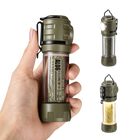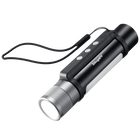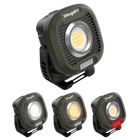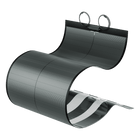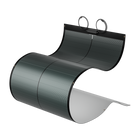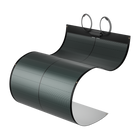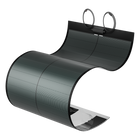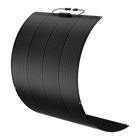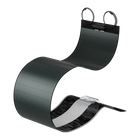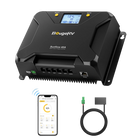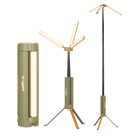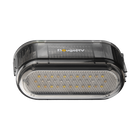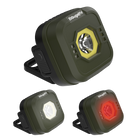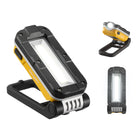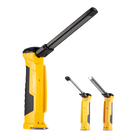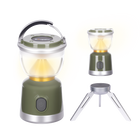Cigs Solar Panels For Tents Make Life Easier


Camping is always an immersive experience for you as well as your family, whether in a tent in the wilderness or in your RV in a front-country campground. You can really feel the sunshine, rain, wind, and snow. You also see wild animals, flora, and fauna in their natural setting. Raw and rough nature - mountains, seashores, sand dunes, and starry sky at night that one cannot see at home. Listening to the sounds of nature – a mockingbird singing in the evening, or a bullfrog croaking in a nearby pond. Or the creepy silence!
Camping is an authentic outdoor adventure with tons of health benefits. It makes the body and mind stronger since it’s stress relieving, plenty of sunshine and fresh air, and activities like hiking, swimming, and other exercises. When you stay in a tent for a few days and nights with your family or friends, you get the opportunity for face-to-face conversation without distraction, singing, and dancing. Bonding happens when you shed aside your usual official shelf and the child inside you come out. Shared simple activities like cooking and eating food with your near and dear ones create memories for life.
However, be careful enough about some downsides of camping like facing extreme weather (too hot or cold or rain), bug bites, and not having basic comfort at home like some lights, cooling, refrigeration, hygiene, charging mobile phones, laptops, and internet connectivity. Especially, if you are with kids, you need to be extra careful.
Lighting on campgrounds is often rather poor at nighttime. There are chances that you might suffer from some sort of accident and create health issues due to that. Some lighting to minimize the risk of accidents and ensure security during your camping trip is of utmost importance.
But carrying heavy battery storage is a big no-no from the point of cost, space, transportation, and handling. CIGS solar panels can be a very handy solution to all your energy needs during camping in a tent. This flexible, lightweight, easy-to-carry solar panel can minimize the battery size and comes within your budget.
Let us here explore the things to consider before buying solar panels and a few advantages of flexible CIGS solar panels that will give a better understanding of this product.
Points To Ponder Before Buying A Solar Panel For Camping
A. Power output and electrical parameters
The power output, voltage, and current are the most important part to check while buying solar panels. Depending on the electrical load requirement for camping (lighting, cooling, heating, charging electronics) there may be different capacities of batteries are required. And to charge the batteries, different power outputs, voltage and current will be required.
In the market, you will find solar panels of sizes 100W, 200W at 25V with 4 Amp or 8 Amp current to charge your batteries that suit camping needs. Ask for the data sheet of the solar panel from the supplier and check it with your battery supplier for compatibility and configuration of panels.
B. Size of the solar panel and packaging
Does size matters? Yes, in the case of solar panels for camping, size really matters. When you carry solar panels with you for a long distance, the more compact and lightweight is always better for transportation and handling. The solar panel is packaged in such a way that it is easy to open and plug in.
C. Ruggedness
In the case of choosing solar panels for a tent, the ruggedness of the panel is a critical parameter to consider. Solar panels with glass may break during jerks on a bumpy road during travel. Even during the installation, it may fall down, and the glass may break.
Why Flexible Cigs Solar Panels Are Best For A Tent?
Experienced campers will tell you that if you have solar panels and battery storage while camping in outdoor environments, you will have the comfort of all your lighting, cooling, and electronics.
Solar panels have come a long way during the last decade. From the small-wattage solar panels to flexible, easy-to-carry solar panels today, solar panels have seen a long journey. And, with the right configuration, you can power anything from a light, fan, or laptop to a refrigerator even on a cloudy day.
The market is divided into two broad categories of solar panels: crystalline silicon-based solar panels and thin-film solar panels. In the thin film types, CIGS solar panels are very promising from their flexibility, lightweight, higher efficiency, and costs.
Crystalline panels have obvious disadvantages for campers for their higher weights, breakability, risk of microcracks, bulky mounting structure, tricky installation, and lower energy generation.
1. Flexible solar panel
The manufacturing process for making CIGS solar panels are completely different from the wafer-based crystalline solar panels. A thin layer of semiconductor material is sprayed over a foldable polymer material for CIGS panels. That makes it very thin, lightweight and 36 degrees flexible.
There are other flexible panels in the market that are made from wafer-based crystalline cells and that are only 20 to 30 degrees bendable. That may not fit with the curved surface of the tent. Another disadvantage is these are heavy.
But the flexible solar panels from the BougeRV is 360 degrees bendable and fits well with any kind of curved surface. These panels are also very light. A 200W CIGS solar panel from BougeRV only weighs only 3kgs, whereas a crystalline solar panel of similar size may weigh 19kgs.

The flexibility of the CIGS panels makes them unique and versatile that make them suitable to fix on any curved or odd surface of an RV or caravan. The deployment is very easy, making it safe from wind thrust while driving, and can withstand the shock of vibration on road.
2. CIGS panel is perfect for Portable Application
CIGS solar panels can be used for portable applications because they are lightweight and flexible. While travelling, camping, or doing other similar activities, they can provide power to charge electronics and other appliances such as portable refrigerators, air conditioners, or ice makers. You can be confident that you will be able to enjoy your drink or find basic comfort for you and your dear ones.
3. CIGS panels are easy to handle and robust
CIGS solar panel do not have the glass on the top. As a result, there is no risk of glass shattering or breaking. In addition, the crystalline silicon cell is extremely brittle. If any weight or pressure is applied to the crystalline silicon cells, microcracks will form. CIGS solar panels, on the other hand, are constructed differently, and there is no risk of breakage or microcracks. This is a huge relief for campers in tents who are travelling.
4. CIGS panels are Lightweight
CIGS solar panels are very thin and use fewer materials to construct the panel. The weight of CIGS solar panels is 6 to 7 times less than of crystalline silicon solar cells. For example, a 200W BougeRV CIGS solar panel weighs only 3 kg, whereas a 200Wp Polycrystalline silicon solar panel weighs 19 kg.
5. CIGS panels generate more electricity
Efficiency and how it is affected by temperature are two significant factors that need to consider while selecting the solar panels. The CIGS solar panel from BougeRV is 16% efficient and has a lower temperature coefficient than crystalline solar panels. The higher the temperature coefficient, the greater the performance loss from the panel as a result of increased temperature.
Another advantage of CIGS solar panels is that they can trap more light from the light spectrum of the sun and operate in low-light conditions. CIGS solar panels can trap light in the early morning and late afternoon. This gives the CIGS solar panels more operating hours to generate more electricity. A 200W CIGS solar panel from BougeRV generates 10-15% more electricity in a year.
Final Thoughts
Nobody wants to take stress for not having basic lighting, cooling, basic comfort or security concern while spending your time in the wilderness, outdoor during camping alone, with your friends or family. Since the whole idea of exploring outdoor, staying inside nature is to destress oneself.
An easy to carry, lightweight solar system with Flexible solar panels fits well for a camper in a tent to charge a battery storage system that can power all electronics, communication system, portable refrigerator, ice maker, lights, air conditioner, etc.
BougeRV is dealing flexible solar panels for all outdoor requirements having experience manpower to guide you from the beginning. If you are thinking to have solar panels for your tent, click here and leave your details so that representative from BougeRV can reach you to provide the right solution. All advisory services from BougeRV is non-binding and free.
FAQs
What size solar panel is good for camping?
The best size solar panel for camping is determined by what you intend to charge with it. If you're looking to charge a smartphone, a smaller single panel (with an accompanying battery) will suffice. If you want to charge multiple appliances or devices, two or more panel setup (connected in a chain) will work better.
Please find the load of each devices and multiply it with the probable hours of operation of the device. You will get the kWh of energy requirement. If you find it tricky, connect to BougeRV for assistance.
Can a solar panel overcharge a battery?
Yes, solar panels can overcharge a battery. To prevent that, a charge controller in between the solar panel and the battery is used. The charge controller works to restrict the overcharging and to restrict the deep discharge of the battery. That way the battery is safe from any damage and give a long life.







